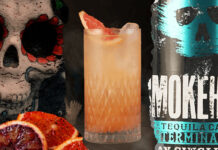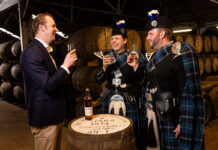Kevin McGhee, Diggers, Edinburgh

What are your customers looking for when it comes to whisky?
Our customers are very varied, just like our whisky selection. They love to flick through the menu of 400 and always find something not available elsewhere locally. Like most things in life, customers want to have an experience. They want to try new things, new tastes, the newest releases and usually capture it on social media. Smokey and rich flavours are the current favourites. Glendronach, Glenfiddich, Glengoyne and Laphroaig have been the most popular over the summer.
What do bar staff do to promote the venue’s selection of whiskies?
We started a whisky festival about five years ago. Working with Ian Fenton from Gordon & MacPhail, we came up with 40 different good quality malts that we sell for £2.50 for 35ml. Our staff always start there and with the aid of a taste map find out what flavours excite customers and point them in the general direction. It’s an inexpensive place to start and explore different types and styles of whisky. I am in the process of putting all of our whiskies onto an app that will hopefully help promote our selection to a larger audience.
How does the team at your bar decide which expressions to stock?
I solely buy the whisky, I love chatting to the reps and finding out what’s happening in the industry and if there’s anything in the pipeline I should look out for. Every summer my partner, dog and tent head on a whisky hunt. I’m just back from Islay and Mull picking up distillery-exclusive drams and I’m off to Speyside next week to do the same. I like to stock everything from everyday whisky to harder-to-find drams that customers will tend not to see in other pubs.
How important is it that staff know their drams?
It may sound obvious but if they have an interest in whisky and they have tried what they are selling it is easier to guide customers. I used to set my prices off 19 drams per bottle so Eric, my longest serving barman and friend, could try every whisky we sell. There’s been a mass improvement in whisky training, led mainly by the brands and that is something that definitely has to be encouraged.
Are consumers more open to mixing with whisky now
Most definitely. Mixology has raised the profile of bars and bartenders. Whilst it is not fully embraced in Diggers it’s only a matter of time until we do. I think whisky like other areas of the industry has noticed an upturn in premiumisation. Perhaps consumers are drinking less but when they do they tend to go for a more expensive, better quality drink. Mixology has introduced different customer bases to whisky and that can only be a good thing.
What is your favourite whisky?
The greatest thing about whisky is that there’s a dram for every occasion. At home I’m currently working through a lovely Châteauneuf-du-Pape cask-finished Tullibardine. My favourite though is Glenfiddich. The 12 year old was my introduction to malt whisky so like a first girlfriend you always make references back to it. The 15 year old is now my everyday dram. The brand is doing so much for the trade, their innovation, POS, reps and trade competitions are right at the top.
Robert Alexander Smith, The Grill, Aberdeen

What are your customers looking for when it comes to whisky?
Our customer base encompasses a wide demographic; many are complete beginners looking for guidance so it’s important to maintain as wide an array of styles and regions as possible. There will always be fans of extremely sherried or peated whiskies, but the most discerning drinker appreciates the differences through contrast.
What do bar staff do to promote the venue’s selection of whiskies?
The most important factor is knowledge of the range, understanding the crafting process, the industry, and, crucially, the various flavour profiles of the whiskies on offer. This goes a long way to helping the customer not only enjoy their dram but also come away feeling like they’ve gained some arcane insight into the world of whisky.
How does the team at your bar decide which expressions to stock?
It’s becoming more difficult with so many available nowadays. It’s really about balancing the selection and making sure that the lesser-known distilleries, regions and styles get fair representation too. We consult the geographical and flavour maps to see where we may have gaps and, of course, customer feedback is always paramount.
How important is it that staff know their drams?
Product knowledge is a key factor in the operation of any business, I think especially so in a specialist establishment. You don’t know what you don’t know when it comes to whisky, and while there are many excellent training courses and tasting schools around, I’ve found the best way to improve staff knowledge of the product itself is to let them dive down the rabbit hole and discover their own journey. Nothing teaches better than experience after all. Pour a few drams and start the conversation.
Are consumers more open to mixing with whisky now?
I think the last decade or so has seen a shift away from the extreme hard traditionalist lines of ‘only neat or with water’. We’ve always had a drink it how you like it attitude. There has historically been something of an aura of sanctity around malt whisky in particular, which maybe helped strengthen brands back in the day, but modern consumers definitely require a more diverse product now.
What is your favourite whisky?
If I had a penny for every time I’ve been asked! For me, it changes almost daily, depending on my mood, the context, the company, the weather. As an Elgin loon, I’m duty-bound to say Speysides are best, but really I think the best dram is the next dram.























